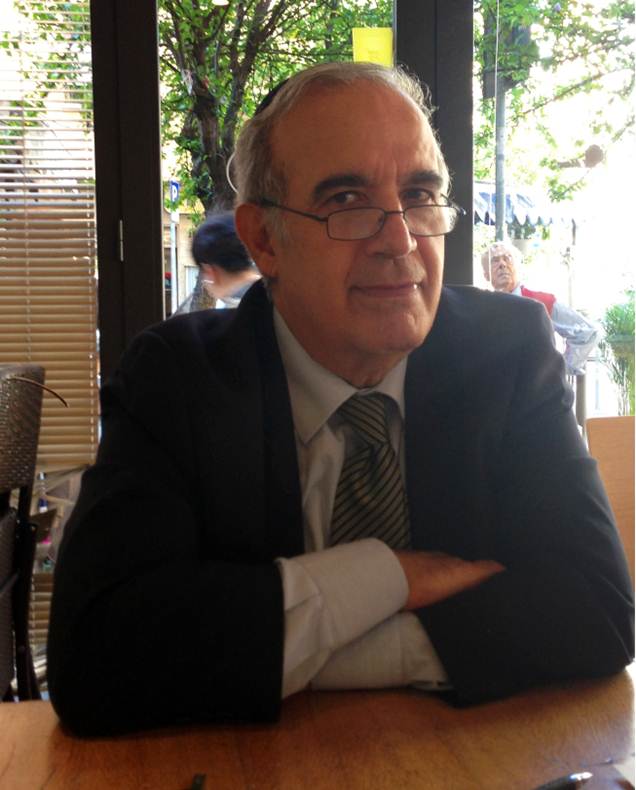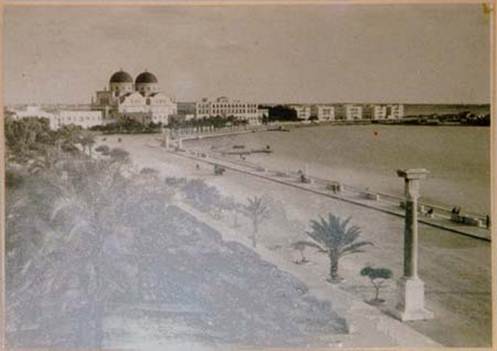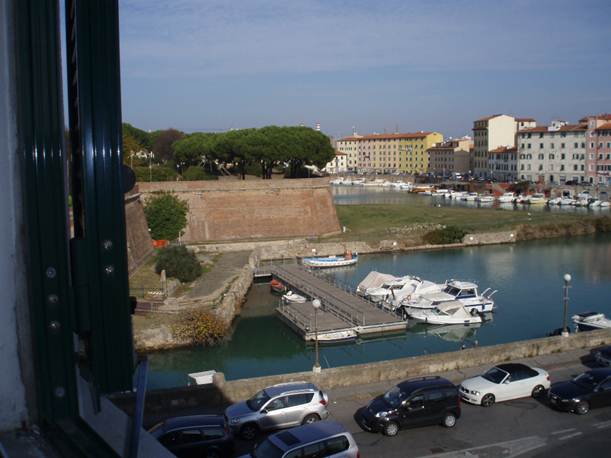Growing up Jewish in Benghazi, Libya:
Interview with Samuele Zarrugh1
By Jacques Roumani2

Fig. 1: Samuele Zarrugh, Rome, 2012. Source: David Bedussa
JR: This interview is being conducted in Rome, October 23, 2011, with Mr. Samuele Zarrugh, the president of the Jewish Community of Livorno.
JR: Good morning, buon giorno, Mr. Zarrugh.
SZ: Good morning.
JR: Mr. Zarrugh, you and your family came originally from Libya, specifically from Benghazi. Could you tell us a little about how you came to Livorno?
SZ: We came to Livorno after the Six Day War, the war of 1967, having gone through everything that the Jews of Libya, both the Jews of Tripoli and those of Benghazi, suffered during that time. We stayed for over a month, more or less, in a camp, for our own protection, then they gave us permission to leave Libya. We arrived first at a refugee camp in southern Italy, at Capua, and from there my family chose to come to Livorno.
JR: How did you come to be elected president of the Jewish Community? It is a very important job, since Livorno is a city of great historical importance in the Mediterranean Jewish world.
SZ: I started my career as an advisor to the Jewish Community of Livorno in 1970, when I was 25 years old. I was appointed by the chief rabbi, who was the head of the council, and by the head of the Community. I succeeded in becoming a member of the council, then I was appointed vice-president, then in 1998, and over the course of the next ten years, I won in three elections.
JR: Auguri, congratulations! Can you tell us something about your life in Libya? Your family was perhaps unique in Benghazi, and even in Libya, in that you had close relations with the Arab population, and you all knew Arabic very well. Unlike most Jews of Libya who tended to speak Italian, you read Arabic, you attended Arabic-language schools, and I think that you yourself are a graduate of the university. Tell us a little about the way things were.
SZ: Well, we attended the Jewish school until 1953, but then it was closed because of lack of funds and also a lack of pupils. We decided then to attend the Arab school. Our Jewish friends decided to go to the Italian school [Scuola dei Fratelli Cristiani]. We [my brothers and I] decided to go to the Arab school because it would lead up to the university, whereas the Italian school only went up to the third year of middle school [la Terza Media]. We attended the Arab school, and also lived in an Arab neighborhood, so we came to know Arab culture. We knew the Arab culture from the market, from the street and from playing together as children. I studied, I finished high school and at the university I majored in the economics of business, I did not receive a degree because just on the day when I was supposed to take the exam in Civil Law, the Six Day War broke out, At that point our lives were at risk, and we came to Italy.
JR: Then your lives were at risk …. But before the Six Day War, how would you describe relations between Arabs and Jews in a neighborhood like yours, where you were the neighbors of Arabs?
SZ: Well, this is how it often is: in an Arab neighborhood, the families that count, when a Jew chooses to live among them, they have, you might say, an obligation to provide some protection, because he has chosen to live among them. This goes for the families that count, not for the masses. Life was not particularly difficult. It was not all roses and flowers, there were some scuffles from time to time, but it was generally positive.
JR: Yes, but the relations of your parents, of your father with his colleagues of the same age, were they the same as your relations with those of your own generation? Was there already a difference?
SZ: There was a lot of difference, because the new generation was somewhat influenced by the propaganda coming from Syria and Egypt. I think today living together would be much more difficult because of nationalism.
JR: After the Italian occupation ended, in the fifties and sixties, being able to speak Arabic must have helped a lot: did you have a specific coffee bar where you met, or were Arab friends invited to your home, or did you invite them during the religious holiday, did this happen?
SZ: Yes, certainly this happened. What happened was an exchange of courtesies, especially when there was a funeral, giving condolences, readings from the Quran. I remember when my father used to go and give taazia [condolences (Ar.)]. It was necessary to do this. And also there were people who were dear to us and I and my brother continued this. We would be invited to attend weddings, and we always went. And there were the games that the boys played in the street, for example soccer games, snooker games, we always played together.
JR: So there were friendly relations between you and Arabs?
SZ: The relationship existed, but it also had to be cultivated, in my opinion. With the Libyan Arabs, and I am talking specifically about those of Cyrenaica, you shouldn't patronize them, nor should you be submissive. It should be a relationship of equals, with dignity, and if you know how to maintain your own dignity, they definitely respect you.
JR: Was there a difference between the social relationship in Cyrenaica and Benghazi, and the relationship in Tripoli?
SZ: There was a big difference. Because Tripoli still had a big Italian presence, and the Jews of Tripoli were greatly influenced by this and by Italian culture. In contrast, the Jews of Cyrenaica were much more integrated into the fabric of Cyrenaica and Benghazi. There was also the language itself. The Jews of Benghazi spoke the Arabic spoken by the Arab masses, who were Bedouins. The Jews of Tripoli spoke a Judeo-Arabic that was much closer to Tunisian Arabic and different from what the Libyan Arabs speak.
JR: Was this written Arabic or only spoken?
SZ: It was written as well, for example the Haggada of Passover was written in the Judeo-Arabic that was spoken in Djerba and Tunisia.
JR: Did you say that with the Arabs you spoke Judeo-Arabic or what we might call classical Arabic?
SZ: We definitely spoke classical Arabic, because it came to us very spontaneously, naturally, it wasn't a case of showing off. When I spoke with an Arab, it came to me automatically to speak the same way. When I visited Libya recently, in 2004, with the delegation [of Libyan Jews] to meet their then-leader, Mo'amar Qadhafi [the delegation never did meet with Qadhafi], and we spoke in Tripoli with the Arabs of Tripoli, they [members of the Jewish delegation originally from Tripoli] were amazed that we [Jews of Benghazi] spoke the same Arabic and used the same expressions as the Arabs, because the [Jews of Tripoli] understood but didn't speak spontaneously.
JR: In the school, you and your brothers were perhaps the only Jews in the school . . .
ZS: Yes, in the beginning. A few others came afterwards, but quit immediately.
JR: How did you manage?
ZS: I think, to be honest, perhaps because I knew how to accommodate. Our relations at school went well, not badly, and also without a great degree of closeness. They considered me like one of them, I joined in the games, I also took part in the classes on Islamic religion, I studied Quran, I studied the Hadith, and I was even perhaps one of the best in the class.
JR: You have also said that you really liked poetry . . . .
SZ: Yes.
JR: Can you recite any poems that have stayed in your memory?
SZ: Well, for example, for me one of the great poets is the poet from Benghazi, Ahmed Rafik al-Mahdawi, who has written a lot. When he talks about a game of backgammon, he says, “ Yalab annardu/ Habibi binibugh wamahara . . .” Ahmed Rafik wrote poems of patriotism and poems of sensuality. Other poets I remember and enjoyed are Ahmad Shawqi (an Egyptian), Nazar Kasbani (a Syrian) and Elia Abumadi (a Lebanese poet who lived and died in the United States).
JR: Besides the poetry, do you remember other things you learned in school?
SZ: Yes, I remember the national anthem, which went "Ya biladi, ya biladi, Libya, Libya, Libya" [sings]
JR: Very interesting, is this the national anthem that the [Arab Spring] Revolution has revived?
SZ: The Qadhafi Revolution cancelled it, has cancelled this one since September 1, 1969.
JR: They have taken the flag of the monarchy, the revolutionaries of today. Do you know whether they have revived the national anthem also?
SZ: I haven't heard. They do refer a lot to the movement of the Sanussi, of King Idris. I don't know how long this will last. We will have to see whether the Islamic faction prevails.
JR: For you who know the Arab world as a whole, and North Africa, could you compare the behavior of the Jews of Libya vis-à-vis the Arabs with those of Egypt or Tunisia?
SZ: A comparison can be made. In Egypt, in the time of King Farouk, some Jews occupied key positions, even in ministries. There were a few men, such as Rabbi Nahum, who was made a member of Egypt’s al-Majma Allugaui which, like the academy for the Italian language in Italy [Accademia della Crusca], was the highest language authority, and had the responsibility to correct the Arabic language. Once in Florence I met a Jewish lady, she was very distinguished, and her husband, Yusuf Wahba, in the time of King Farouk had been governor of the Bank of Egypt. There have been other Jews, too, in important positions in Egypt. All of these were Egyptian Jews. But no Libyan Jew had ever occupied any high position, even in the time of the monarchy. In Morocco it was the same as in Egypt: in Morocco Jews occupied important positions, even today the king has a Jewish adviser, and there were some Jewish representatives in parliament. In Libya there was never any Jewish representative or Jewish government official.
JR: But during the colonial period, how had the Jews been treated?
SZ: In Cyrenaica, when the Italians arrived, the Jews saw in them a civilization that would treat them better than had the Turks. Afterwards, when the Fascist racial laws came, the Jews, exactly like the Arabs, suffered under these laws. The Jews were taken to the Giado camp, and many died from cholera and typhus. Thus the Jews suffered in Libya just as the Arab and Muslim citizens did, under Fascism. There were Jews in Cyrenaica who helped the movement of Omar al-Mukhtar because they hoped for liberation from the Fascist regime.
JR: So, has this role of the Jews been recognized in Libyan history?
SZ: This has been recognized on an individual level, never on the collective level. But no individual Jew ever received any award or recognition [benemerenza] for this.
JR: In 1969 the monarchy was overthrown by the Qadhafi regime. Have you had any relations with the Qadhafi regime?
SZ: With the regime no, with Arabs who went back and forth, yes. Mostly economic relations . . . . From the regime there were occasional declarations, for the consumption of the press--sporadic declarations in order for the regime to look good. There was no real opening [toward the Jews]. The Jewish community of Cyrenaica goes back to the time of the First Temple, and the Jewish community of Tripoli goes back to the Spanish period (1510-1530) and beyond.
JR: Has there been interest among the Jews of Italy in the situation of the Libyan Jews?
SZ: There has been interest, certainly, insofar as the Libyan Jews have suffered. Any opening up by the regime interested us, of course. A person can never forget the country where he was born. We have suffered, some have even been killed, not only in 1967 but also before that, in 1945 and 1948, but when we hear someone trying to make fun of our country of origin, we never appreciate it and we feel offended.
JR: Libyan culture, Libyan food, the prayers etc.--are they being forgotten?
SZ: No, thank God, Jews from Libya, especially the majority from Tripoli, who are in Rome, have opened their own synagogues and follow their own way of praying [riti]. Obviously the dominant culture has an influence, to some extent. In Livorno we have managed to introduce and preserve the Benghazi customs within the Jewish community of Livorno.
JR: So it is something that has been integrated into Italian Jewish life?
SZ: Yes, now in Rome there are so many kosher butchers, kosher restaurants, so much return in teshuva [greater religious observance] because now the Roman Jews see the Jews of Tripoli and follow what they do. There are intermarriages between the two communities, and things are going in the most positive direction possible.
JR: And now that Libya has liberated itself from the Qadhafi regime, just today they are celebrating the liberation, we hope for a period of freedom and more openness. What do you think are the prospects and what are your hopes for the new Libya? What do you think can be done on a formal level to promote relations between Jews and the new Libya?
SZ: I believe that freedom will not come quickly, because Libya has always consisted of a series of large tribes, who have been at war with each other in the past, and thus this transition will not be easy. I hope there will be an opening, I hope Libya will become a democratic republic, secular, and one day the Libyan Jews will also have a right to vote, like Italians who live abroad and who can vote for the Italian parliament. But this is a hope, for the distant future, and perhaps we ourselves will not see it happen. I hope above all that Libya will not turn toward Islamic fundamentalism.
JR: This is a Jewish community that goes back to Roman times . . . .
SZ: Absolutely. I am thinking of founding an association of the Jews of Cyrenaica which would not be against anyone but would have a program of telling our children and grandchildren about the history of their parents and grandparents. What the history was of the Jews of Cyrenaica, about the revolt against the Romans, what the Jews experienced during the whole period of Islam. What Jews did for the independence of Libya, and afterwards, up to the 1967 expulsion. And I'd like to teach them about our liturgy and prayers, which are a little different from those of Tripoli. Maybe our liturgy has been less influenced from the outside. Obviously it has been somewhat influenced by that of Tunisia, and the Island of Djerba. Thus when we speak we should speak with some collective authority. We need to form an association so that when a representative speaks, he speaks in the name of the collective. This has not happened so far and this lack [of responsible representatives] has caused damage and problems.
JR: The story of your family and community is really fascinating, and I am looking forward to reading something written by your own hand that will expand on this, and we wish you great success with your projects, and hazak ubaruch!
SZ: Thank you, and I am also counting on you.

Fig. 2: Benghazi, yesterday. Courtesy of Vivienne Roumani-Denn (From the collection of F. S. Legziel)

Fig. 3: Livorno, today. Source: Judith Roumani
Notes
1 Samuele Zarrugh is a businessman and has recently completed his third term as president of the Jewish Community of Livorno. Born in Benghazi, Libya, he has been resident in Livorno since 1967, when together with the entire Libyan Jewish community he was forced to leave as a refugee.
2 Jacques Roumani also grew up in Benghazi, is a Middle East specialist and consultant in public sector development, and visiting professor at the University of Maryland.
